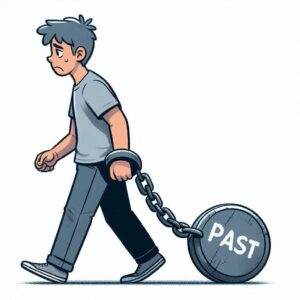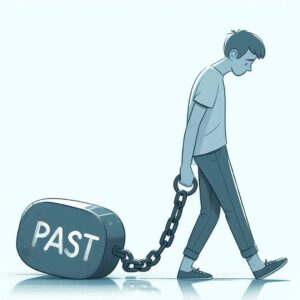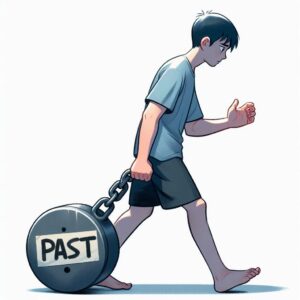過去の重荷とは?
この風刺画について
この風刺画は「過去の重荷(Burden of the Past)」をテーマに制作した作品です。
人は誰しも、忘れられない過去、克服できない記憶、あるいは後悔を抱えて生きています。
私はその心の重さを、視覚的に「鎖でつながれた重い錘」として表現しました。
風刺画には人物が登場し、それぞれ異なるシチュエーションの中で、「PAST」と書かれた重りを引きずりながら前へ進もうとしています。
左の人物はうつむき加減で、まるで過去に引きずられているような姿勢をしています。
中央の人物は少し前を見据えて歩いており、重荷はあるものの希望が見える印象を持たせました。
右の女性は静かに前進していますが、背後にはどこか霧がかった雰囲気があり、心の中にまだ整理しきれていない何かがあることを暗示しています。
風刺画上部には日本語で「過去の重荷」、下部には英語で「Burden of the Past」と表示し、文化や言語を問わず、誰もが抱える普遍的なテーマであることを示しています。
この風刺画は、決して「過去は悪」と伝えたいわけではありません。むしろ、「過去とどう向き合うか」が人の生き方に深く関わるものであり、その向き合い方が人それぞれ異なることを描き出そうと試みました。
風刺画のポイント
この風刺画を描くうえで最も大切にしたのは、「過去」という見えない概念を、誰もが一目で理解できる具体的な象徴に落とし込むことでした。
私は「PAST」と書かれた重りと鎖というアイテムを通じて、過去の記憶や体験が人の行動や思考に与える制約や影響を視覚的に表現しました。
この錘はあえて丸みを持たせ、極端に大きく描くことで、「逃れられない重さ」や「長い年月による蓄積感」を印象づけています。
人物の服装や姿勢、歩き方も重要な要素です。
左の人物は身なりも地味で、足取りが重く、完全に過去に支配されている状態を表しています。
中央の人物は半ズボンで素足にすることで、少し前向きさや自由さが見えるようにしました。
右の女性は落ち着いた服装で、感情を表に出さず、それでも過去をしっかりと引きずっているという、内面的な葛藤や整理しきれない感情を表現しています。
背景は極力シンプルにし、登場人物と重りに注目が集まるよう工夫しました。
左は単色に近い冷たいトーン、中央は少し光が差すような配色、右は雲のような抽象的な背景にして、三者三様の心情が伝わる構成にしています。
これにより、見る人が自分自身の状態に重ねやすくなり、感情移入しやすくなると考えました。
また、「過去」を引きずるという言葉をそのままビジュアルに落とし込んだことで、言葉の比喩性と視覚的メッセージの強さが重なり、心に残る作品となるように工夫しました。
私はこの風刺画を通して、「過去の重荷から完全に自由になることは難しいけれど、それでも歩み続ける人の姿には美しさがある」と伝えたかったのです。
人生において、過去は切り離すものではなく、共に歩む存在だという視点を、この作品で表現できたと感じています。
AIが描いた「過去の重荷」
AIが描いたイメージ(画像)
 |
 |
 |
 |
 |
 |

コメント